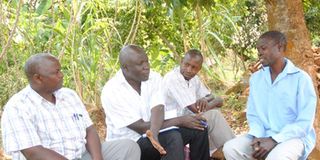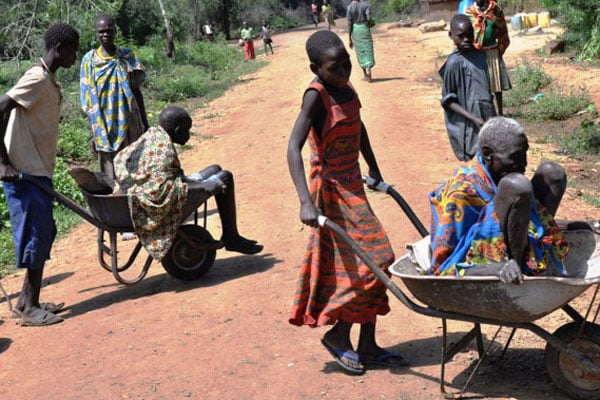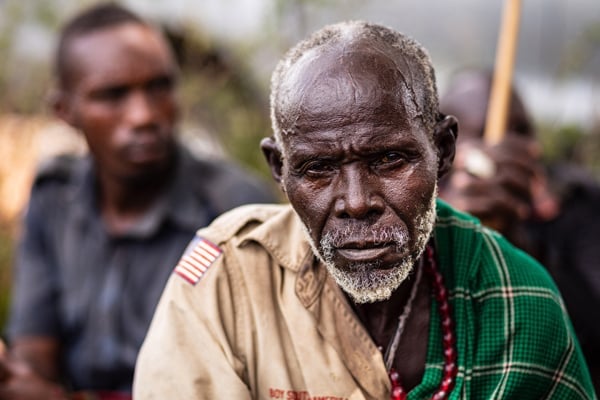Prime
Kalangala oil palm project tainted by land grabbing

Mr John Muyisa (R) with his lawyer Kefa Kaweesa (2nd L) explaining how his land was grabbed without compensation. PHOTOS BY MARTIN SSEBUYIRA.
What you need to know:
The project that has been a source of income for some farmers, has left others crying foul over land grabbing by unscrupulous individuals.
Kalangala is one of the traditional fishing islands. Like other fishing villages, the island faces the problem of dwindling fish stock attributed to over fishing.
A palm oil growing project in the areahas been the other source of income. To many, it was a blessing in the face of the now less lucrative fishing trade. However, environmental degradation concerns and land grabbing continue to pop-up at this archipelago.
Recently, a meeting was held between the aggrieved locals who claim their land was grabbed and Kalangala oil palm growers’ trust, Friends of the Earth International, National Association of Professional Environmentalists (Nape) and Vegetable Oil Development project (VODP).
Report out
Some of the claims are documented in a report released by Friends of the Earth International in May. The report states, “The project is being promoted as a poverty-reducing endeavour, yet it is causing displacement, food insecurity and deforestation.”
It continues: “There are serious questions about the justification for donor funding and private investment in the project. Friends of the Earth International is backing the demands of the affected communities for the return of land improperly taken, guarantees for the protection of community land rights, compensation for crop damage, and long term protection of community forests, water, and other natural resources.” Nape’s Senior Administrator, Geoffrey Kamese said the stakeholders’ meeting was inevitable because there were issues to iron out.
Land grabbing accusations
Mr John Muyisa, 51, a resident of Buyindi Village, Mugoye Sub-county in Kalangala District is one of the farmers who shared their stories at the meeting. He says when the oil palm project came to Kalangala, the then District Agricultural Officer (DAO) David Balironda advised them to start growing palm oil trees.
Mr Muyiisa had by then lived on this land for more than 33 years until Mr Balironda summoned them in his office saying the land belongs to a one Ssempa and has given them a lease, meaning he would compensate squatter’s plantations.
The vividly old but strong Muyisa narrates that he was offered two alternatives: Shs1.2 million with two acres of his land with a title or six new acres with a title. He rejected both offers. He recollects: “On July 3 2011, bull-dozers, caterpillars, graders among others were deployed and destroyed all my plantations. I hired a cameraman to take photos of what was going on as Kalangala District NGO forum Chairperson Edward Lule Ssenkimpi and Kalangala district councilor Jim Jim Gyagenda recorded videos of the same scene.” Mr Muyisa recounts that he then went to police who referred him to the RDC’s office but was told he could not stop the activity.
Stakeholders’ views
Mr Balironda, now Kalangala District’s production and marketing officer, said that some of the issues raised by the residents were valid though there were a few exaggerations. He said that other than Mr Muyisa who rejected all the offers demanding for Shs200million that couldn’t be paid to a squatter, other people got some money.
The General Manager of Oil Palm Uganda, Lim Choon Meng has dismissed the claims levelled against the project by farmers like Mr Muyisa. “Let’s set up a committee having representatives from all stakeholders to investigate these claims and we have the matter settled,” he said.




